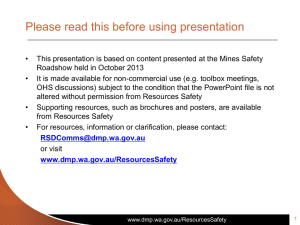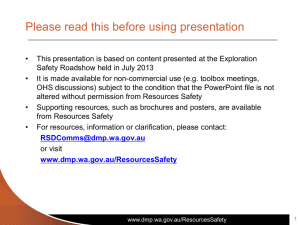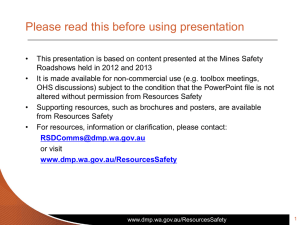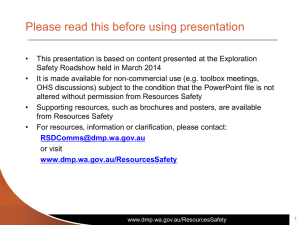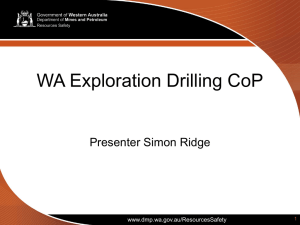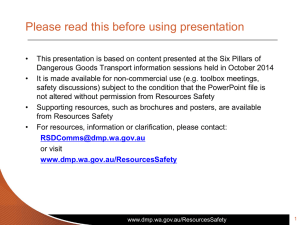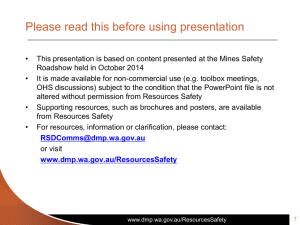High risk work
advertisement
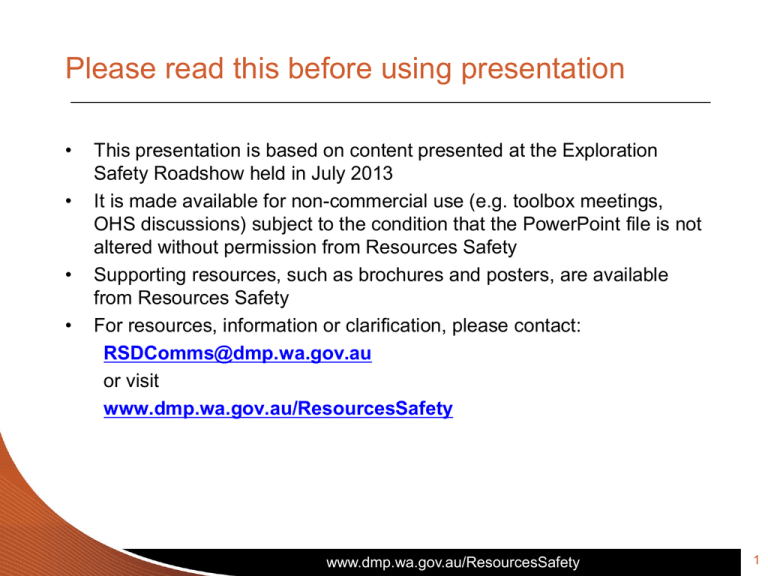
Please read this before using presentation • • • • This presentation is based on content presented at the Exploration Safety Roadshow held in July 2013 It is made available for non-commercial use (e.g. toolbox meetings, OHS discussions) subject to the condition that the PowerPoint file is not altered without permission from Resources Safety Supporting resources, such as brochures and posters, are available from Resources Safety For resources, information or clarification, please contact: RSDComms@dmp.wa.gov.au or visit www.dmp.wa.gov.au/ResourcesSafety www.dmp.wa.gov.au/ResourcesSafety 1 High risk work What do you need to know about high risk work on exploration sites? www.dmp.wa.gov.au/ResourcesSafety 2 What do you need to know about high risk work? • Licences are required for all high risk work (HRW) conducted on mine sites including exploration • HRW is any work conducted within the scope of a high risk licence, based on the National Standard, including: – crane and hoist operations including vehicle loading cranes – rigging work (dogging; basic, intermediate, advanced rigging) – forklift operations www.dmp.wa.gov.au/ResourcesSafety 3 What legislation covers HRW licensing? Mine Safety and Inspection Regulations 1995 • Reg. 6.37(1)(a) A person must not do high risk work of a particular class at a mine unless the person holds a high risk work licence for that class of work • High risk work and high risk work licences have the meaning given in the Occupational Safety and Health Regulations 1996 regulation 6.1 Occupational Safety and Health Regulations 1996 • Reg. 6.1 (1) refers to a list of classes and descriptions of high risk work in Schedule 6.3 of OSHR 1996 www.dmp.wa.gov.au/ResourcesSafety 4 What are the 29 licence classes? Basic scaffolding (SB) Intermediate scaffolding (SI) Advanced scaffolding (SA) Basic rigging (RB) Portal boom crane (CP) Boom-type elevating work platform (WP) Intermediate rigging (RI) Bridge and gantry crane (CB) Personnel and materials hoist (HP) Advanced rigging (RA) Vehicle-loading crane (CV) Vehicle-mounted concreteplacing boom (PB) Dogging (DG) Non-slewing mobile crane (CN) Slewing mobile crane up to 20T (C2) Forklift truck (LF) Order-picking forklift truck (LO) Slewing mobile crane up to 60T (C6) Materials hoist (HM) Self-erecting tower crane (CS) Slewing mobile crane up to 100T (C1) Tower crane (CT) Basic boiler operation (BB) Slewing mobile crane over 100T (CO) Derrick crane (CD) Intermediate boiler operation (BI) Reciprocating steam engine operation (ES) Turbine operation (TO) Advanced boiler operation (BA) www.dmp.wa.gov.au/ResourcesSafety 5 What does regulation 4.13 cover? • Workers are required to be assessed as competent before commencing task – Unless in training and supervised • Supervisors must be aware of the competencies of their workers before assigning tasks • Employers have a duty to ensure employees have had the training required www.dmp.wa.gov.au/ResourcesSafety 6 What is verification of competency (VOC)? • VOC assessments are how industry compensated for the ‘ease’ of acquiring a HRW license • VOCs ensure operators are suitably trained and confirms their ability to conduct the work safely for each individual plant • Establish a VOC system for – Employees – Contractors – Specialists using site equipment – Specialists using their own equipment www.dmp.wa.gov.au/ResourcesSafety 7 What licence for multi-tool carriers or telehandlers? • Operator competency and high risk work licence requirements vary depending on the attachment/configuration • Duty of care – information, instruction training and supervision • Reg. 4.13 www.dmp.wa.gov.au/ResourcesSafety 8 What licence for forklifts? • Forklift (LF) – covers the operation of a powered industrial truck equipped with a mast and an elevating load carriage to which is attached a pair of fork arms or other attachment www.dmp.wa.gov.au/ResourcesSafety 9 Video demonstrating how not to lift Source: http://www.youtube.com/watch?v=hfh2yObrOHw www.dmp.wa.gov.au/ResourcesSafety 10 What about dogging and rigging? Dogging work – applying slinging techniques for the purpose of lifting a load, including selecting the method of the lift and inspecting lifting gear or directing the operator of a crane or hoist in the movement of a load. • Classes (DG, RB, RI, RA) – Dogging (DG) – slinging techniques including inspection of gear, directing crane, selecting method, unloading drill rods – Rigging Basic (RB) – steel erection, static lines – Rigging Intermediate (RI) – tilt up, dual lifts, demolition – Rigging Advanced (RA) – fabricated hung scaffold www.dmp.wa.gov.au/ResourcesSafety 11 Can I conduct dogging activities? www.dmp.wa.gov.au/ResourcesSafety 12 What licence for truck-mounted cranes (HIAB)? • Vehicle loading crane (CV) – covers the operation of a crane with a capacity of 10 metre tonnes or more, mounted on a vehicle to move a load onto or from the vehicle • r (metres reach) x L (tonne Load) = metre tonnes r so 2m x 5.5t = 11 metre tonnes Centre line of then CV required rotation L www.dmp.wa.gov.au/ResourcesSafety 13 Want to know more? • Contact WorkSafe WA for all HRWL enquiries • Visit www.worksafe.wa.gov.au to download forms and for more information www.dmp.wa.gov.au/ResourcesSafety Ensure you receive your renewal notice! • Over half of HRW licence holders do not have their current address registered with WorkSafe www.commerce.wa.gov.au/worksafe/hrwlchangeofaddress/ www.dmp.wa.gov.au/ResourcesSafety What’s happening at your site? 1. What type of high risk work occurs at your sites? 2. Who on site assesses the licence requirements for these activities? 3. How is competency assessed? What would you like to know about HRW? www.dmp.wa.gov.au/ResourcesSafety 16
